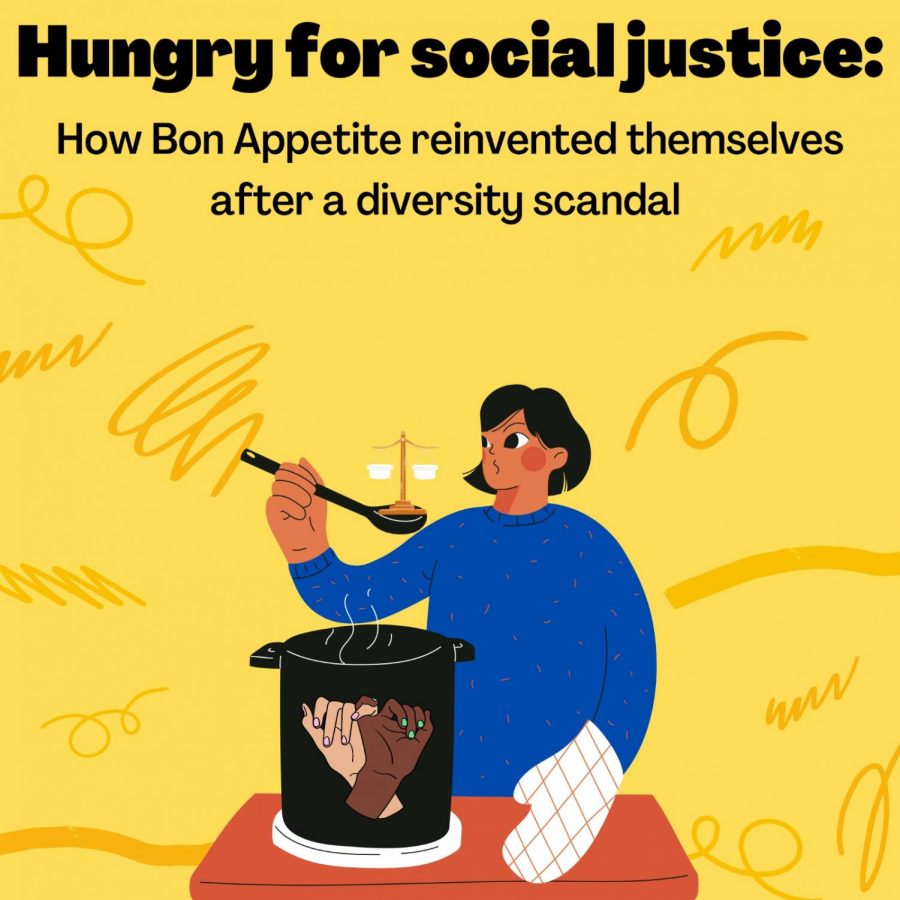Hungry for social justice: How Bon Appetite reinvented themselves after a diversity scandal
After a tumultuous six months, food and entertainment magazine, Bon Appetit (BA) has emerged with a new commitment to diversity and representation.
Following multiple accusations of tokenizing their Black, Indigenous, People of Color (BIPOC) staff members, as well as a wage disparity, the company revamped their image, replacing their video hosts and management to include more people of color. BA recently announced a new team of eight BIPOC video hosts to take over their YouTube channel, which has a large presence of almost six million subscribers. Additionally, an entirely new set of BIPOC management was introduced, featuring new Black Editor-in-Chief Dawn Davis, Mexican-American Executive Editor Sonia Chopra and Ethiopian Global Brand Advisor Chef Marcus Samuelsson.
The company first came under fire in June when a photo from 2013 of their then editor-in-chief, Adam Rapoport, resurfaced on Twitter, revealing a Halloween costume where he was in brownface. In the photo, Rapoport and his wife have visibly darker skin, and are dressed in their perceived image of a stereotypical Puerto Rican: chains, a white tank top and an Instagram caption with the hashtag #boricua. In response, Assistant Food Editor Sohla El-Waylly took to Instagram and posted stories demanding Rapoport’s resignation. On top of the scandal, she also alleged an abundance of systemic racism that permeates a hostile environment within Condé Nast, the global media company that owns BA and many other prominent magazines.
“I’ve been pushed in front of video as a display of diversity,” El-Waylly wrote. “Only the white editors are currently paid for their video appearances.”
Other BA staff spoke out on their social media condemning Rapoport and spoke of how BIPOC staff were sidelined and tokenized. Days later, Rapoport resigned. The rest of the chefs featured on BA’s YouTube channel announced that until their BIPOC colleagues were compensated equally, they would not appear in any more videos. After two months of negotiation, El-Waylly and Krishna revealed that their demands were not met, and announced that they would no longer appear in any YouTube videos. Following this, eight more of the 13 BA YouTube staff declared that they too would not be resigning contracts with Condé Nast in solidarity with their BIPOC colleagues.
“I have been supported and rewarded for my work,” Lalli Music wrote on a Twitter post. “My BIPOC co-hosts have not. There’s no way I can go back to video after all these failures.”
In addition to the new staff, BA has pledged to promote diversity and fix the past broken compensation system, creating a team that is representative of their larger audience.
“What I really want to do is create a place where we are talking about food and culture together,” Chopra said. “We’re building a really inclusive place, where everybody can find stories that resonate with them and also learn something new.”






























